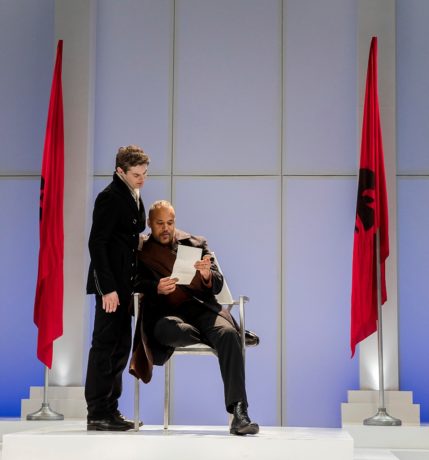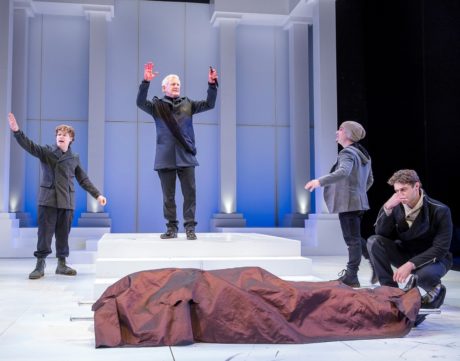For the Pennsylvania Shakespeare Festival’s current production of Julius Caesar, Director Patrick Mulcahy views the Bard’s ancient Roman history through a post-modern lens. Set in an imagined future, with a mash-up of references to the past and present, the universality of Shakespeare’s themes and his observations on human behavior are undeniable and enduring. The focus here is less on any specific identifiable era, and more on the playwright’s classic lessons about mob mentality, a public that is too easily swayed by cunning leaders, and the devastating effects of blind ambition, envy, greed, and the thirst for power, which abide across time.

The lead actors deliver the message loud and clear, in a style filled with believable emotion and psychology. Keith Hamilton Cobb is dignified and imposing as Caesar, with his deep resonant voice and towering stature, as he here attempts to fight off his knife-wielding attackers (a seeming anachronism in the future, considering the rampant gun violence of our time and the weapon of choice for killers), in a fruitless effort to save his own life (fight choreography by J. Alex Cordaro).
Greg Wood’s Cassius speaks in a natural conversational manner that is readily comprehensible to a 21st-century audience, with feelings of anger, indignation, and seriousness, and a defining “lean and hungry look” that is well conveyed by his expressive face and body.
Christopher Patrick Mullen is funny as the gossiping Casca (who admits, when asked what Cicero said about Caesar, that “it was Greek to me”), until the talk turns to deadly action.
Henry Woronicz’s Brutus displays a range from friendship to enmity, reluctance to duplicitousness, and uncontrolled rage to reconciliation. By contrast, Spencer Plachy’s Marc Antony is deliberate in his demeanor and calculated in his speech, as he delivers his iconic “Friends, Romans, and Countrymen” eulogy for the noble Caesar.
Mulcahy’s blocking on the thrust stage, with the audience seated around three sides, impedes some of the sight lines for such key scenes as the assassins bathing their hands in the dead Caesar’s blood, thereby reducing the horrifying impact for those whose view is obstructed by the actors encircling his corpse. But the director also employs the theater aisles to integrate the ensemble into the viewers’ space, thereby making the mob scenes more immediate and making us feel a part of them, with the cast pumping its fists and shouting all around us. It’s a potent reminder of the need to think for oneself, and not to jump on the bandwagon of specious politicians or to be carried away by reckless public opinion.
A stark white minimalist set by Steven TenEyck is inspired by classical architecture, but made more sharp, angular, and futuristic than the ancient prototypes, with electronically advancing and receding steps, and unembellished rectalinear piers instead of the traditional fluted portico columns. Simple portable chairs, tables, banners, and flags serve to define the changing scenes and locales within the stationary framework, and clean basic colors of background lighting, also by TenEyck, accentuate the shifting moods of the play.

An effective sound design by Don Tindall captures the crashes of a thunderstorm, the notes of heraldic trumpets, and the noise of chanting and cheering crowds off in the distance, while costumes by Marla Jurglanis support the production’s futuristic reimagining, which, for a contemporary young audience, might be more engaging and relatable than ancient togas. But with the cast’s clarity and the supreme eloquence of Shakespeare words, the plot points and morals would come across no matter what they were wearing or when it was set, be it in ancient Rome or “In states unborn and accents yet unknown!” (Cassius, Act III, Scene 1).
Running Time: Approximately two hours and 30 minutes, with a 15-minute intermission.
Julius Caesar plays through Sunday, July 17, 2016, at the Pennsylvania Shakespeare Festival, performing at the Labuda Center’s Schubert Theatre – 2755 Station Avenue, in Center Valley, PA, on the Campus of DeSales University. For tickets, call (610) 282-WILL, or purchase them online.





